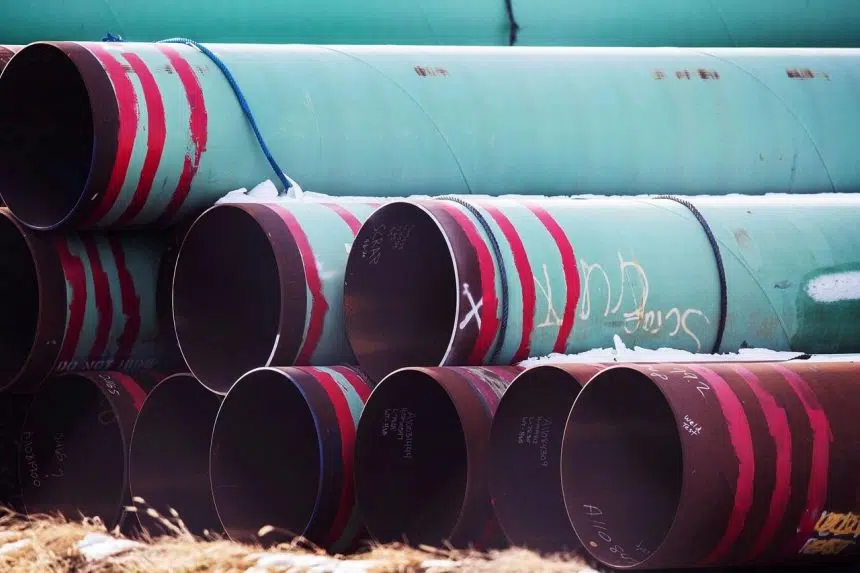CALGARY — Newly inaugurated U.S. President Joe Biden carried out his campaign promise to tear up the presidential permit keeping the Keystone XL expansion alive Wednesday, hours after the pipeline owner said it would halt work on the project.
Calgary-based TC Energy Corp. said Biden’s action would overturn extensive regulatory reviews that found the pipeline would transport needed energy in an environmentally responsible way and bolster North American energy security.
It also warned the move will lead to the layoffs of thousands of union workers and comes despite its commitments to use renewable energy to power the pipeline and forge equity partnerships with Indigenous communities.
The company remains committed to growing earnings and dividends through its investments in critical energy infrastructure even without Keystone XL, said Francois Poirier, who took over as TC Energy CEO at the beginning of the year.
Meanwhile, environmental groups applauded Biden’s move.
“Killing the Keystone XL pipeline once and for all is a clear indication that climate action is a priority for the White House,” said Dale Marshall, national climate program manager for Canada’s Environmental Defence.
“We should take heed when the biggest customer for Canada’s oil kills a pipeline that is already under construction. The Keystone XL pipeline never made sense for either the U.S. or Canada.”
In contrast, Saskatchewan Premier Scott Moe said it’s “incredibly troubling” that TC Energy has suspended work on Keystone XL.
“Now is the time for our nations to strengthen our trading relationship, not erect further barriers to collaborative and sustainable development,” he said in a statement.
The Progressive Contractors Association of Canada said in a news release it is disappointed that Biden is “putting politics before reason.”
“Pulling the plug on a major project, hours after taking office, is a rocky starting point for resetting Canada/U.S. relations,” said PCAC president Paul de Jong.
The association, whose member companies employ thousands of Alberta and B.C. construction workers, said the pipeline would have generated as many as 60,000 direct and indirect jobs in Canada and the United States.
Prime Minister Justin Trudeau has said he will continue to press Biden to allow Keystone XL to proceed.
Conservative Leader Erin O’Toole called the cancellation of the permit “devastating.”
“We need to get as many people back to work, in every part of Canada, in every sector, as quickly as possible. The loss of this important project only makes that harder,” he said.
TC Energy approved spending US$8 billion in the spring of 2020 to complete Keystone XL after the Alberta government agreed to invest about US$1.1 billion (C$1.5 billion) as equity and guarantee a US$4.2-billion project loan.
Alberta Premier Jason Kenney has said the province has about $1 billion at risk if the project is killed.
The 1,947-kilometre pipeline is designed to carry 830,000 barrels a day of crude oil from Hardisty, Alta., to Steele City, Neb. From there it would connect with the company’s existing facilities to reach the U.S. Gulf Coast one of the world’s biggest oil refining hubs.
TC Energy announced a plan Sunday for the Keystone XL project to achieve net zero emissions by spurring an investment of over US$1.7 billion in communities along the Keystone XL footprint to create about 1.6 gigawatts of renewable electric capacity.
The Calgary-based company has also struck a deal with four labour unions to build the pipeline and has an agreement in place with five Indigenous tribes to take an ownership stake.
Some 200 kilometres of pipe have already been installed for the expansion, including across the Canada-U.S. border, and construction has begun on pump stations in Alberta and several U.S. states.
TC Energy said it will stop capitalizing costs, including interest during construction, effective Wednesday, and will evaluate the carrying value of its investment in the pipeline, net of project recoveries.
It says this will likely result in “substantive” mostly non-cash writedowns in its first-quarter financial results.
“Our base business continues to perform very well and, aside from Keystone XL, we are advancing $25 billion of secured capital projects along with a robust portfolio of other similarly high-quality opportunities under development,” Poirier said in a statement.
Biden was vice-president in 2015 when Barack Obama rejected Keystone XL for fear it would worsen climate change.
Then-U.S. President Donald Trump approved it again in March 2019.
Dan Healing, The Canadian Press











